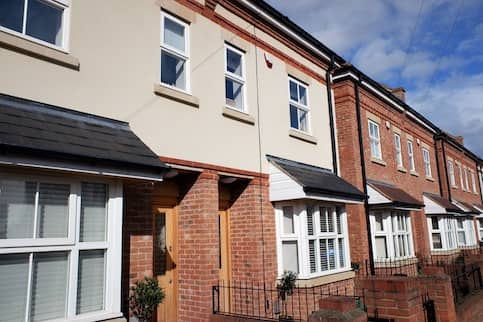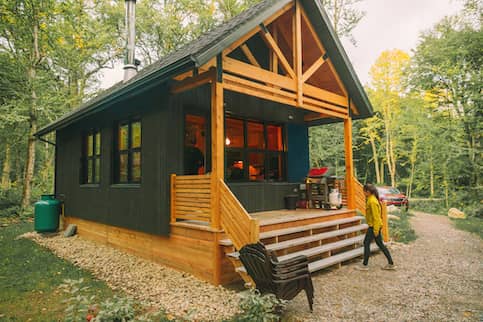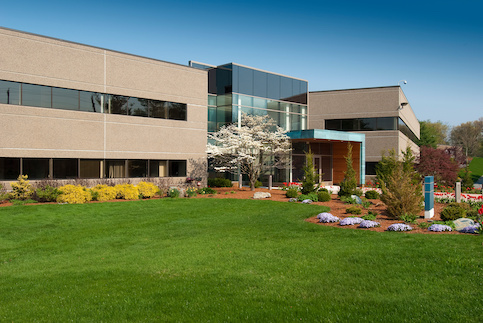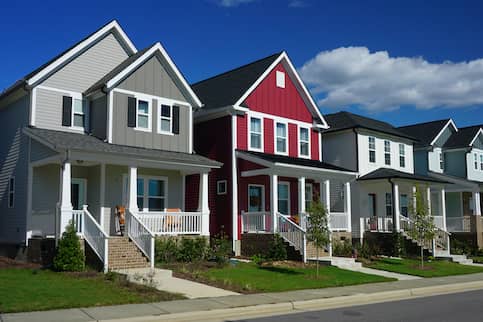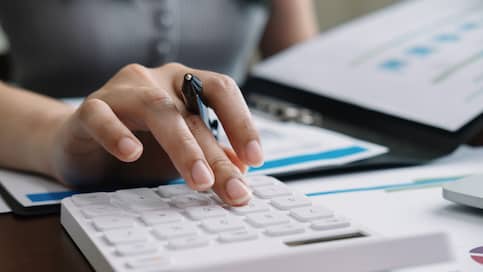Is Buying A House A Good Investment?

A home is many things. It’s where you put down roots and connect with a community. It might be where you raise a family. It’s a sanctuary at the end of busy days. But is a home a good financial investment?
It could be. Several factors, including how long you live in a home, how much you pay for it and where it’s located, influence how much profit you’ll earn when you sell.
Let’s take a closer look at what makes buying a home a good investment and what factors you should consider before investing.
Is Buying A House Worth It?
Ideally, buying a house can be a great financial investment and well worth the price you pay because your home’s value can increase after you purchase it. The hope is that this appreciation will be enough, and if you pay off your mortgage loan before selling, you’ll earn a solid profit.
Buying a home may also be a good investment because it can positively impact your net worth over time. In 2020, a Federal Reserve survey found that families that owned a home had a median net worth of $120,000, which is a 13.2% increase from the 2016 median of $106,000. The findings demonstrate that owning real estate can help a household build wealth, especially in the long term.
But, like all investments, a return isn’t guaranteed. Home values usually appreciate over time, but it doesn’t always happen. If you buy your home when real estate values in your community are high, your residence’s value may fall after you move in. If home values fall by enough, you may be forced to sell your home for less than you paid for it.
That’s why you should weigh the factors that make buying a home worth the investment against the costs.
Consider the following advantages of homeownership before committing to it.
Take the first step toward buying a house.
Get approved to see what you qualify for.
Intangible Benefits
Besides being a financial investment, a house is an emotional investment. For many, owning a home remains a key part of the American dream. Your home may be the place where you watch your children grow up or indulge in your creativity and decorate the home to your taste and style. And when you’ve had a long, stressful day, your home can be your refuge, the place where you recharge.
Other intangible benefits can include putting down roots in a strong community, living near highly ranked schools and having enough space for a growing family. Because of these benefits, most people don’t look at homes only as financial investments. Even if you don’t make a big profit when you sell, you’ll still enjoy the benefits of owning a home.
Tax Benefits
Homeownership has additional financial benefits, such as tax deductions and credits. A deduction can reduce your taxable income by allowing you to subtract specific expenses. If you own a home, you can deduct:
- Property tax payments
- Mortgage points
- Mortgage interest
- Private mortgage insurance (PMI)
There are also tax credits homeowners can claim for energy-efficient updates. Tax credits work by reducing the amount you owe in taxes. If you installed ENERGY STAR-rated equipment, like heat pumps, air conditioners, boilers, furnaces or water heaters, you may be eligible for federal income tax credits available through 2023.
Home Equity
Another financial advantage of owning a home is the equity you can build. The longer you live in your home, the more likely you are to earn a solid profit when you sell. That’s because you’ll build home equity as you make your mortgage payments.
Equity is the difference between what you owe on your mortgage and what your home is worth. For example, if you owe $100,000 and your home is worth $200,000, you have $100,000 in home equity.
You can build equity in two ways. You can do it over time by reducing the amount you owe on your mortgage. And you can build additional equity on top of this if your home’s value increases.
Borrow Against Your Equity
It’s easy to see why equity is important for a homeowner who is ready to sell, but what if you don’t plan on moving anytime soon? Thankfully, there are a few ways to use your home equity.
You can borrow against your home equity by taking out home equity loans or home equity lines of credit (HELOCs). You can use the money for anything you want, from renovating your outdated kitchen to paying for your children’s college tuition.
Home equity can also be converted with a cash-out refinance. Using the previous example, let’s say you refinance your home. If your lender allows you to convert 80% of your home equity and you have $100,000 in equity built up, you can cash out up to $80,000.
Convert Your Equity Into Profit
As mentioned above, when you sell your home, the equity in it helps determine how much money you can pocket after closing the sale. Say you sell your home for $250,000 and owe $120,000 on your mortgage. After paying off what you owe on your mortgage, you’d have $130,000 left over.
Some of that money will go toward your REALTOR® or real estate agent’s commission and any closing costs, but the more equity you’ve built in your home, the more dollars you’ll leave with after closing your home sale.
Your home is more likely to become a good financial investment the longer you live there. The longer you stay in your home, the more years there are to watch its value appreciate. Historically, owners living in their homes for at least 7 years tend to see their property rise in value.
The key to earning money from a home sale is to pay down your mortgage, build equity and hope that you’ve purchased in a neighborhood where your home’s value will rise.
Potential Passive Income
You can also take advantage of homeownership and invest in real estate by renting your home to help cover your monthly mortgage payment.
You can use this investment method to lower the costs of owning a property while you wait for it to grow in value. Once the home has sufficiently increased in value, you can sell for a profit.
You may even choose to hold on to your rental property for decades. Once the mortgage is paid off, those monthly rent payments will generate additional cash flow.
However, being a landlord has its challenges. It can be difficult to find good tenants who pay their rent on time. You may struggle to find renters in some markets, requiring you to cover the mortgage payments on your investment property with your own money. You may even end up with a home that doesn’t appreciate, and your investment may eventually lose money.
See What You Qualify For
Home Purchase
Home Refinance
Tap Into Equity
What Can Make Buying A House A Poor Investment?
While a home can earn a solid profit when you sell or rent it out, there are potential pitfalls. It’s not inexpensive to buy or maintain a home. If you spend too much on a home or buy the wrong home, you may struggle to earn a solid return on your real estate investment.
Closing Costs
Besides a down payment, one of the biggest upfront expenses of buying a home is the closing costs lenders and other third parties charge. You’re charged for the work each party does and your mortgage loan.
Closing costs can vary, but you can expect to pay 3% – 6% of your total loan amount. If you’re buying a home that costs $150,000, you’ll typically pay $4,500 – $9,000 in closing costs.
You’ll have to factor in these costs when determining whether a home is a good investment. The higher your closing costs, the more home equity you’ll need to build to earn a profit on your real estate investment.
Long-Term Costs
The costs of homeownership don’t end after buying your home. It takes money to own and maintain a home, which can cut into the investment value of your property.
Property Taxes
As a homeowner, you must pay property taxes each year. How much you pay will depend on where you live. Property taxes are higher in some states and lower in others. According to the U.S. Census Bureau, the average annual property tax bill for U.S. homeowners is $2,690.
Maintenance
Maintaining a home isn’t cheap. Experts estimate owners should expect to pay from 1% to 4% of their home’s purchase price in annual preventative maintenance and repair costs. If your home cost $200,000, you can expect to pay $2,000 – $4,000 a year to maintain it.
Homeowners Insurance
If you take out a mortgage loan, your lender will require you to pay for homeowners insurance. Homeowners insurance protects you if your home is damaged, destroyed or burgularized. While the cost of the insurance will depend on the age and size of your home, the 2021 National Association of Insurance Commissioners report found that the average U.S. homeowner pays $1,249 a year in homeowners insurance.
Real Estate Market Trends
Another challenge with investing in real estate is that there’s no guarantee the home you purchase will see the kind of price appreciation you want.
It’s important to study real estate market trends before buying a home if your goal is to purchase real estate as an investment. By studying trends, you can determine whether home values have risen in a neighborhood and for how long.
FAQs About Why Buying A House Is A Good Investment
Learn more about investing in a home with the answers to these frequently asked questions.
How can I ensure my home is a good investment?
Because buying a home is such a big monetary investment, it’s important to be financially stable before you apply for a mortgage. This includes saving for a down payment, building a strong credit score, budgeting for the costs of owning a home and building cash reserves to act as a financial cushion if you have a financial emergency.
Taking these measures before investing can help you pay off your mortgage faster, build more equity and hopefully make a profit when you sell your home.
What are the benefits of owning a home?
Buying a home can come with many advantages, including:
- Better financial stability
- Additional tax breaks
- Ability to build wealth through equity
- Permanent primary residence
- Strong community relationships
Should I buy a house or invest in the stock market?
Buying real estate and investing in the stock market has risks and rewards. To determine which choice is the better option, evaluate your personal goals. Do you want to live in a home? Do you have enough money for a down payment and closing costs? Can you cover the home’s maintenance and upkeep? If so, buying a home could be the right choice.
Is it cheaper to buy than rent?
The affordability of renting versus buying mainly depends on your location. In some cities with high rents, apartment living can be more expensive than owning a home. However, buying a house usually has more upfront costs than renting.
The Bottom Line
Should you consider the home you plan to buy as an investment? Maybe. But you might not see much profit when selling if you pay too much for your residence upfront, move too early or aren’t ready for the responsibilities of owning a home.
If you’ve studied your local housing market, have a sizable amount of savings and are ready to keep your new home for several years, your investment in real estate can pay off.
Ready to buy a home? Get started on the initial approval process to learn what mortgage rates and terms you can qualify for.
See what you can afford.
Quicken Loans® can help you find a lender.
